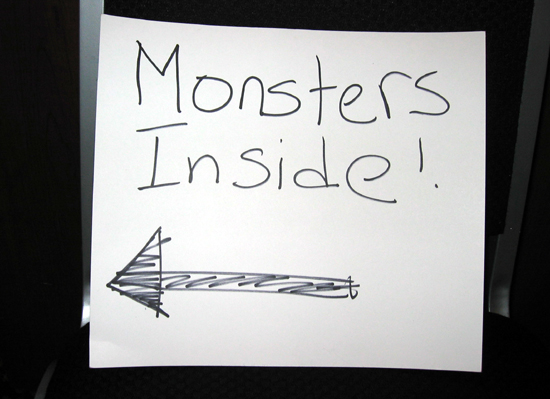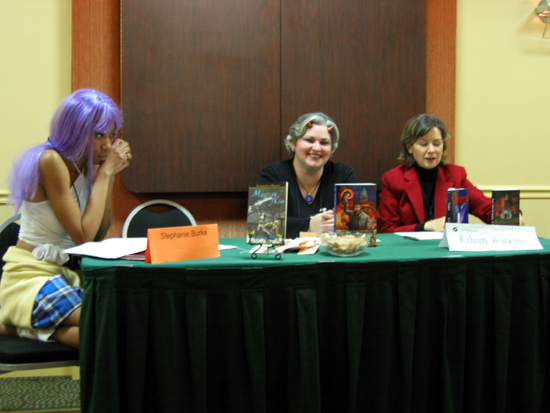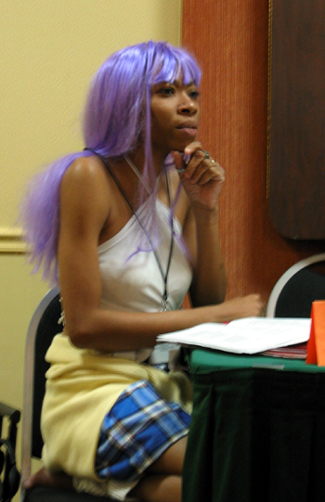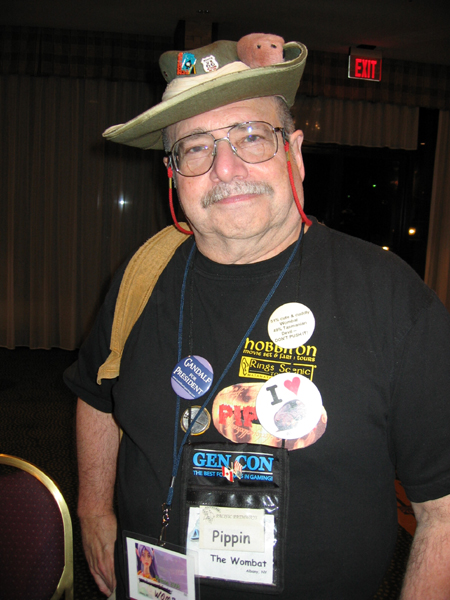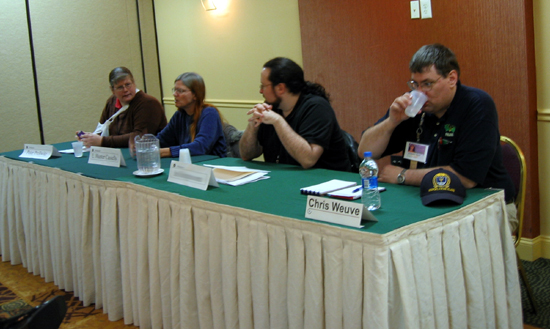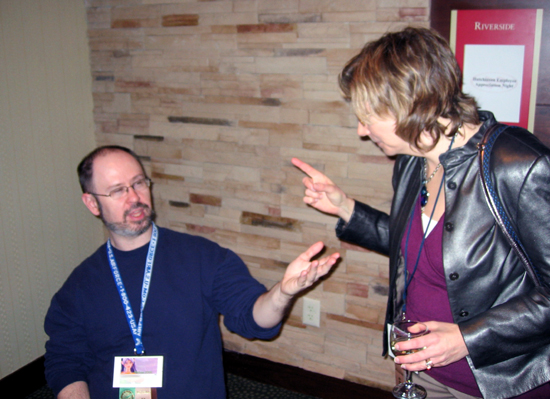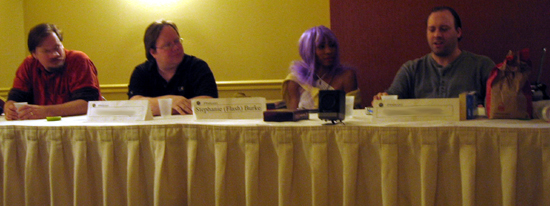This weekend was Philcon, and my husband, The Gryphon, and I were panelists. The Gryphon also volunteered to take over the Gaming section, because the person who had been in charge had stepped down. In this job, The Gryphon faced a steep challenge, because nothing had been planned ahead of time. He would have to wing it, setting up games and announcing them through the Philcon rocket, which is the twice daily convention update, printed and available at several places around the convention.
Musings
an Online Journal of Sorts
By Alyce Wilson
November 24, 2008 - Here There Be Monsters
D.J. Rock, who will be heading the convention next year, had invited us to the guest dinner, for the keynote speakers and Philcon staff. It was being held in the hotel restaurant. This year the convention was held in Cherry Hill, New Jersey, at the Crowne Plaza Hotel. According to Mapquest, it would take about a half hour to get there (not including, of course, rush hour traffic). Unfortunately, The Gryphon had to stay later than planned at work, so we didn't start out until about 4:30. The dinner started at 5.
When we walked into the small room in the back of the restaurant, a number of people were already seated, including the keynote speaker, Tim Powers, and special guest Scott Christian Sava, both at the opposite end, on either side of DJ Rock, who sat at the head of the table. We took the only two chairs that were left. But that didn't last long. Since a few more guests were expected, DJ Rock flagged down the waiter and asked him about getting some extra chairs. Everybody had to shirt over to make room for them. Then, after a couple more guests arrived, but the artist guest of honor was still expected, we all had to move again.
This time, people exclaimed, "No room! No room!" and joked that it was like the mad tea party in Alice in Wonderland. References to Alice would become a leit motif for the weekend.
Next to arrive were the artist guest of honor, John Picacio, and his wife. John said to me, perhaps because I was the first to make eye contact, that he was sorry for being late. "It's no problem," I assured him. He walked around the table, greeting everyone with a handshake. Then he and his wife took the empty seats at the end of the table, next to me.
Of course, one more person arrived, a panelist and her husband. But there was only one chair left. Rather then wait for the waiter to figure out what to do, she told us she'd eat elsewhere. No amount of cajoling from DJ Rock could sway her.
I ordered the Hawaiian Butterfish, and the Gryphon got the buffet. During the course of the meal, The Gryphon and I got into a conversation with John Picacio. He's a very outgoing sort of person, who exudes self-confidence and professionalism. I noticed that he made a point of using my name several times during the conversation, a memory technique I recognized from having used myself.
We talked about Philadelphia and the arts. He said Philly is a very unassuming city, very relaxed and welcoming. In turn, he told us about San Antonio, where he lives. Even though it's the fifth largest city in the U.S., he said it lacks some of the cultural offerings of other cities. When we mentioned films we've seen at the Philadelphia Film Festival, he said he wishes San Antonio had something comparable.
The Gryphon and I left before dessert, since he had to set up in the gaming area, and we both had to pick up our badges and schedules. The Gryphon mentioned, as we left the restaurant, that we had to locate the Philcon treasurer to pay for our meals. As we entered the lobby, we saw a group of people on one of the couches: The Filmmaker and several people I didn't know. I was in a silly mood and started calling the treasurer's name. "Are any of you the Philcon treasurer?" I asked. They weren't, but they said they'd just seen him walking the other direction. The Gryphon, anxious to check in, said he'd find him later.
The Crowne Plaza offered several advantages over the Center City hotel of years past. It had free parking, a more spacious feel, and a more sensible room layout. I noticed that immediately upon entering the Green Room. For the last couple years, the Green Room was a cramped enclave. This year, we didn't feel crowded as we waited to check in.
When it was our turn, The Gryphon stepped forward and confused the staffers by giving them both of our surnames. They thought that was his name, and they looked for it, until we set them straight.
As we waited for them to complete our check-in process, I joked with a guy behind me, who was wearing several pins and a large, flat-brimmed hat (much like any number of SF fans). I was greatly amused by his badge, which identified him as "wombat," his preferred nickname. Turns out he's greatly interested in wombats (natch) and their preservation.
I followed The Gryphon to Convention Operations (misspelled "Opps" instead of "Ops" on the sign), where he spoke to the folks in charge. They gave him a special ribbon to stick on his badge, indicating his status as the head of gaming. Then someone led us to the gaming area, a segment of hallway lined with tables near the ballrooms, in which several large events would be held.
I thought it was really cold back there and was secretly glad that I wouldn't have to spend long hours in the chill. The Gryphon assured me he'd be OK. A couple of his helpers, which included a game designer, introduced themselves. I glanced through the schedule, discovering that The Anthology Editor was on an interesting panel, already in progress, so I told The Gryphon I'd return after it ended.
The panel was titled "What Defines a Monster?" and in addition to The Anthology Editor, it included writer Eileen Watkins (also the moderator), along with one of my all-time favorite Philcon guests, romance, horror and erotica writer Stephanie Burke, who is witty and fun, always dresses in interesting costumes.
As I entered, they were discussing the use of monsters in mythology and literature to indicate punishments or lessons. The werewolf, for example, is a lesson not to go into the world alone. Stephanie Burke told us about a mythical character who would murder children if they stayed up too late!
They acknowledged that trend is now changing, and monsters are seen as being cool. By contrast, in old legends, the ugliness of a monster often indicated its inner ugliness. Today, however, monsters are used for catharsis and for entertainment. They are more and more often portrayed as sympathetic, just like anyone who is ostracized for being different. And there is more of a tendency for monsters to be portrayed as looking like real people, which modern viewers and readers find more frightening, knowing that the worst monsters are often people who at first appear normal.
During the audience question period, we asked about some other mythological monsters. I brought up the stories of men who turn into bears once they are married, much to the horror of their wives. We discussed how this might be a cipher for domestic violence. This got Stephanie Burke talking about a number of other monstrous stories from Native American lore, which she had studied in preparation for another Philcon panel. Another audience member mentioned in some native cultures there are stories of willow trees who can uproot themselves and follow you, muttering. Everyone found that more amusing than frightening, which probably says a lot about the modern attitude towards monsters.
Afterwards, I greeted both The Anthology Editor and Stephanie Burke, then headed back to the Gaming area. The Gryphon had his laptop out and showed me, cheerfully, that he'd scheduled a couple gaming events for the next day. He allowed me to check my e-mail, and then I settled down to look through the schedule. I had glanced through Friday and was beginning on Saturday when wombat walked up. He had added a little plush wombat to his hat, which I thought was funny, so he allowed me to get a picture.
We got into an interesting conversation about wombats and the efforts to preserve them. He also told me that he's been striving to build his resume in entertainment and recently served as an assistant producer for an episode of Adam Gertler's new show on The Food Network, Will Work for Food. In addition, wombat has a friend who has connections, whom he hopes can get him hired to work on The Hobbit. He told me he'd also love to put on a costume and serve as a dwarf extra, which he said would suit his physique. Turns out wombat is very knowledgeable about J.R.R. Tolkien. In fact, he was one of the panelists for the "Tolkien Vs. Rowling" panel.
The Gryphon was finished with what he had to do, so we took his laptop out to the car to store it safely in the trunk. Then we returned, walked through the dealers' room and stopped in at the "Meet the Pros Party and Artist Reception," outside the Art Room. They had a bar set up in the hallway, so we each got drinks.
I spotted the keynote speaker, Tim Powers, in a conversation with writer Michael Swanwick. I'd wanted to approach Powers about doing an interview for Wild Violet. So after waiting long enough to realize the conversation wasn't ending any time soon, I walked up and said hi to Michael Swanwick, reminding him we were on a panel together last year, on blogging. I also told him that I'd begun a LiveJournal and subtitled it "the examined life of writer and editor Alyce Wilson," based on a comment he'd made.
Then I introduced myself to Tim Powers and told him I was interested in setting up an interview. We exchanged contact info and promised to figure something out the next day, once he had a better idea of his schedule.
Since it was still going, we dropping in on The Cheshire Cat's panel, "Survivability of Electronically Published Material." This was a somewhat technical panel, but I understood a great deal.
They spoke about how the prevalence of texts on the Internet might lead to a propagation of copies, including printouts, which might ensure the survival of some texts. The Cheshire Cat pointed out that it's essential to continually copy material to the newest medium, or else the mechanism of playback may one day be gone. But he added that electronic data are ephemeral, too easily damaged to be permanent, especially in the face of a disaster that could wipe out all electrical equipment.
A fellow panelist agreed but said she wasn't concerned about whether everything survived into the far future. She pointed to the beautiful impermanency of Tibetan sand paintings, which are painstakingly created and survive only a brief time. Not everything, she said, is worth preserving.
Downstairs, we spent a little while talking to The Anthology Editor's husband, The Military SF Author. I mentioned that I was going to be interviewing Tim Powers, and he acted offended: "I'm an author, and you've never interviewed me." I promised to set something up with him following the convention.
The Gryphon, however, thought it would be funny if he would beg, so he had us pose for this picture, wherein The Military SF Author is supposed to be begging for an interview while I'm being a bit stern. I think it looks more like we're having an animated argument.
The last thing I attended was the panel called "These Are a Few of My Favorite Scenes," which I joined already in progress, while The Gryphon returned to the gaming area to seek out some of his gaming friends. This panel was part of the anime track, which is run by a friend, The Pop Junkie. Another friend, The Dormouse, was on it. Coincidentally, so was Stephanie Burke. The fourth member was Dave G. Wilson III (no relation).
The room was dark, since they were playing videos, so this is the best pic I got.
They showed clips from both anime and other animation, many of which I had not seen before. Some were classics, such as the opening of Bubblegum Crisis, one of The Dormouse's favorite scenes. Stephanie Burke contributed a really violent sequence from a recent anime series, as well as one I found incredibly funny, from a series called Cromarty High School.
I discovered my inner geekdom when someone in the audience remarked, "There was a substitute teacher in the first episode of The Sarah Conner Chronicles TV series called Mr. Cromartie who turns out to be a terminator."
Without missing a beat, I said, "He's not just in the first episode. He's their recurring nemesis throughout the first two seasons." Afterwards I thought to myself, "Really? Did I just say that? Did I just correct somebody on a picayune fact from a SF series? I hate it when people do that!"
In Cromarty High School, a student deliberately sabotages his placement exam for high school, trying to get assigned to the same school as his academically-challenged friend. Ironically, his friend tests better than him, so they still go to separate schools, but he's forced to attend a school filled with dunces and miscreants. He must find a way to fit in.
The drawing style is more realistic, and the clip we saw made great use of narration to make humorous commentary on the action. I'll have to seek it out.
On the polar opposite side of things, Robert Fenelon shared a clip from a series called Hero Quest, of which copies are rare in the U.S. It's set in a world where dinosaurs are gods and conflicts resolved by playing soccer. He showed us some key matches, including one in heaven, for the fate of the world, playing against a huge dinosaur, a.k.a. God. We had fun calling out things to the screen.
Since the clip was in Japanese with no subtitles, Robert described the action and provided a rough translation.
At the close of that clip, I looked at my watch and discovered it was getting late, so I headed out. Just as I stood up, The Pop Junkie described an Italian animated version of The Titanic, where problems are solved by rap music! I said, "And with that, I'm out of here," and left.
Just as I was headed out, I met The Gryphon, walking towards the anime room to collect me. He'd simultaneously decided it was time to go. We'd arranged for our dog walker to look in on Luke and Una, but we still had a bit of a drive.
Once I got home, I couldn't go right to bed. I had to look up a few things on the Internet to prepare for the next day, and I didn't get to bed until 3 a.m., later than I'd hoped.
Moral:
One person's monster is another person's god.
Copyright
2008 by Alyce Wilson
What
do you think? Share your thoughts
at Alyce's message board (left button):
![]()
![]()
